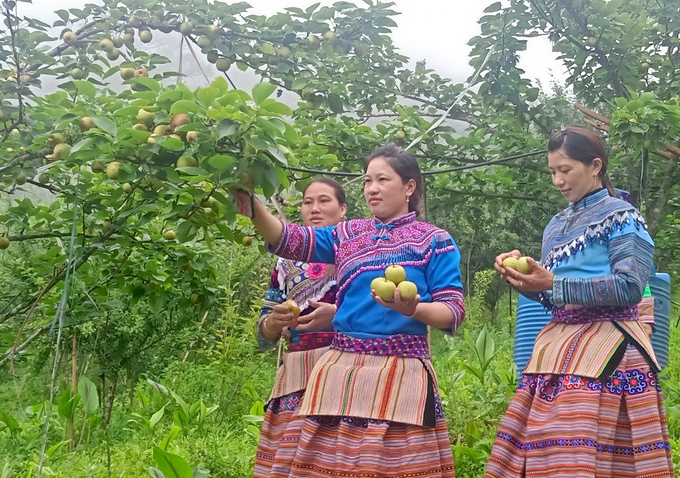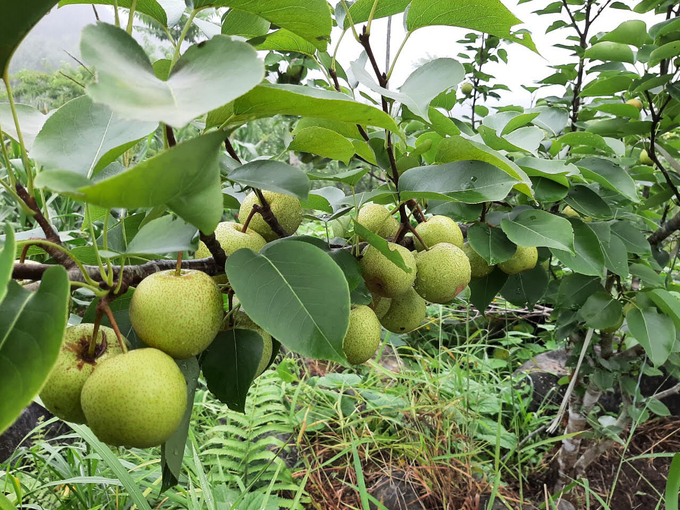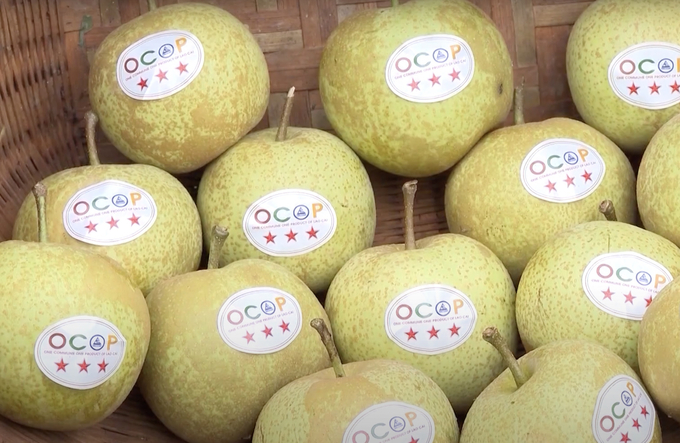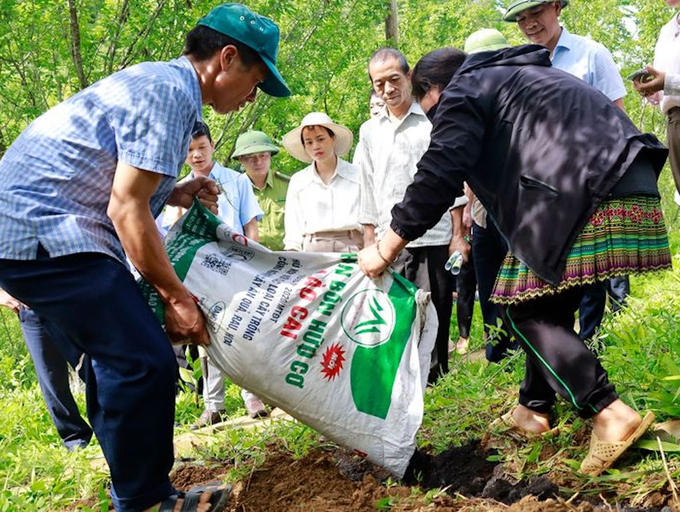November 21, 2025 | 22:26 GMT +7
November 21, 2025 | 22:26 GMT +7
Hotline: 0913.378.918
November 21, 2025 | 22:26 GMT +7
Hotline: 0913.378.918
Nearly 10 years ago, the mountainous district of Si Ma Cai began to introduce the VH6 pear variety from Bac Ha Vegetable Farm. Thanks to the land’s suitable altitude, cool climate and good care techniques, this temperate fruit tree has shown clear economic efficiency. VH6 pears in Si Ma Cai have now been recognized as a 3-star OCOP product of Lao Cai province, thanks to which pears are increasingly consumed in the market.

Pear brings a more prosperous life to ethnic minorities in Si Ma Cai (Lao Cai). Photo: Hai Dang.
According to Then Manh Hung, Head of the Office of Agriculture and Rural Development of Si Ma Cai district, identifying agroproduction as a key task, Si Ma Cai has issued a resolution on developing commodity agriculture for the period 2021 - 2025, vision to 2030. The number one priority is to communicate and encourage local people to convert the farming structure from low-value crops to high-value crops and apply science as well as technology to production.
The localities find themselves in a tight spot as the land for production is small, not concentrated, with steep hills and scattered terrain, so Si Ma Cai choose to develop temperate fruit growing areas in an organic and sustainable direction, both increasing product value and preserving soil quality.
"For people growing fruit trees on steep hills like plums and pears, we instruct them to create beds along the belt and create terraces to facilitate care and fertilization, while also limiting soil erosion and washout. By ensuring nutrients in the soil, the fruit will retain quality and stay delicious," said Then Van Hung.

Si Ma Cai pears are grown organically, ensuring quality and food safety. Photo: Hai Dang.
Mu Trang Phin village has 130 households, all of whom are Mong people. Along with growing corn and rice, many households have boldly switched to growing temperate fruit trees. The whole village currently has approximately 50 ha of pears and 30 ha of Ta Van plums.
“Mu Trang Phin village currently earns more than VND 3 billion annually from temperate fruit trees. The people's lives have been improved. More than 20 households are able to build spacious houses. Families here can earn VND 50 - 100 million each year from selling pears, and many of them have escaped poverty,” said Giang A Su, Standing Deputy Secretary of the Party Committee of Can Cau commune.
With 3 ha of plums, the life of Hang Seo Sinh's family in Seng Sui village has become more stable. "Specialized staff always tell us to take good care of the land, apply techniques so that the trees have fewer pests and diseases, grow well without having to use pesticides, chemicals, or chemical fertilizers. We also take advantage of green manure and composted animal waste to fertilize the trees," he said.

3-star OCOP Si Ma Cai pears from Lao Cai. Photo: Hai Dang.
The consumption link needs to be secured
In the hope of ensuring stable output for a large amount of products, Si Ma Cai district and Lao Cai Department of Industry and Trade have put pear products on e-commerce platforms such as Portmart and Shopee. They have also linked up with traders, businesses, and clean agro-product sales points to help local people consume pears and plums. Some units have also researched ways to deeply process pears and plums into products such as wine or jam instead of simply selling them fresh.

People are increasingly aware of environment-friendly farming practices and more active the use of organic fertilizers for temperate fruit trees. Photo: Hai Dang.
However, there are still some difficulties ahead which need to be resolved. According to Vu Thi Nhung, Director of Man Than Cooperative (Man Than commune, Simacai district), when the price is good, people often harvest early, so the fruit quality is not guaranteed. There are still cases where the cooperative works with local people, but when the season comes and traders push up the price, people no longer sell to the cooperative but look for traders outside, causing many difficulties for the production and business plan of the cooperative.
“When pears are ripe, Chinese pears are also very competitive in terms of price, making it difficult to sell. In addition, consumers cannot distinguish between pears grown in Si Ma Cai and pears grown in other localities because many neighboring localities and other provinces are also expanding the cultivation of temperate fruit trees. Therefore, in the long term, when the area and output of temperate fruit trees in Si Ma Cai increase, we need to create connections and linkages to sustainably consume products,” said Director Vu Thi Nhung.
Translated by Samuel Pham

(VAN) Results from the Sustainable Durian Model Project in Dak Lak have confirmed the critical role of Yara Viet Nam in transferring advanced nutritional solutions to farmers.

(VAN) In Tuyen Quang province, livestock farmers have introduced effective models and innovative practices that significantly strengthen African Swine Fever prevention and control efforts.

(VAN) This is the study conducted by IRRI and Can Tho University on the rice straw value chain in Mekong Delta showing an economic potential of more than 6.6 trillion VND/year.

(VAN) By participating in cooperative economics, many farmers in Tay Ninh have overcome hardship, mastered clean dragon fruit cultivation techniques.

(VAN) The crossbreeding program in the former Binh Dinh province (now part of Gia Lai) has shown signs of decline, and urgent measures are needed to revive it and sustain past achievements.

(VAN) The agricultural sector agreed on a roadmap to pilot the MRV protocol and expand low-emission rice production from the 2025-2026 winter-spring crop.

(VAN) Agricultural extension officers in Quang Ninh do more than transmit knowledge; they have become a steadfast support system for farmers on the path to sustainable agricultural development.